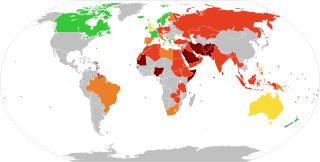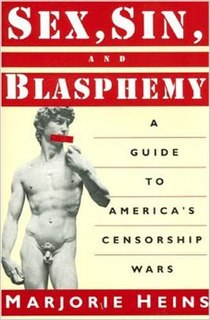Blasphemy, as defined in some religions or religion based laws, is an insult that shows contempt, disrespect or lack of reverence concerning a deity, a sacred object or something considered inviolable.
Leonard Williams Levy was an American historian, the Andrew W. Mellon All-Claremont Professor of Humanities and Chairman of the Graduate Faculty of History at Claremont Graduate School, California, who specialized in the history of basic American Constitutional freedoms. He was born in Toronto, Ontario, and educated at the University of Michigan as an undergraduate and at Columbia University, where his mentor for the Ph.D. degree was Henry Steele Commager.

Humanists International is an international non-governmental organisation championing secularism and human rights, motivated by secular humanist values. Founded in Amsterdam in 1952, it is an umbrella organisation made up of more than 160 secular humanist, atheist, rationalist, skeptic, freethought and Ethical Culture organisations from over 80 countries.

The Pakistan Penal Code, the main criminal code of Pakistan, punishes blasphemy against any recognized religion, providing penalties ranging from a fine to death. According to the US Commission on International Religious Freedom, around 80 people are known to be incarcerated in Pakistan on blasphemy charges — half of those face life in prison or the death penalty. From 1967 to 2014, over 1,300 people were accused of blasphemy, with Muslims constituting most of those accused. According to human rights groups, blasphemy laws in Pakistan have been exploited not only for persecuting minorities but also for settling personal rivalries, often against other Muslims. Though no judicial execution has been carried out under these laws, many of those accused, their lawyers and any persons speaking against blasphemy laws and proceedings have become victims of lynchings or street vigilantism in Pakistan. More than 75 people were murdered for blasphemy between 1987 and 2017.

Blasphemy in Islam is impious utterance or action concerning God, but is broader than in normal English usage, including not only the mocking or vilifying of attributes of Islam but denying any of the fundamental beliefs of the religion. Examples include denying that the Quran was divinely revealed, the prophethood of one of the Islamic prophets, insulting an angel, or maintaining God had a son.
Freedom of speech is the concept of the inherent human right to voice one's opinion publicly without fear of censorship or punishment. "Speech" is not limited to public speaking and is generally taken to include other forms of expression. The right is preserved in the United Nations Universal Declaration of Human Rights and is granted formal recognition by the laws of most nations. Nonetheless the degree to which the right is upheld in practice varies greatly from one nation to another. In many nations, particularly those with authoritarian forms of government, overt government censorship is enforced. Censorship has also been claimed to occur in other forms and there are different approaches to issues such as hate speech, obscenity, and defamation laws.

Freedom of speech is a principle that supports the freedom of an individual or a community to articulate their opinions and ideas without fear of retaliation, censorship, or legal sanction. Freedom of expression is generally used synonymously but, in legal sense, includes any activity of seeking, receiving, and imparting information or ideas, regardless of the medium used.

A blasphemy law is a law prohibiting blasphemy, where blasphemy is the act of insulting or showing contempt or lack of reverence to a deity, or sacred things, or toward something considered sacred or inviolable. According to Pew Research Center, about a quarter of the world's countries and territories (26%) had anti-blasphemy laws or policies as of 2014.
Blasphemy is not a criminal offence under Australian federal law, but the de jure situation varies at state and territory level; it is currently not enforced in any Australian jurisdiction. The offences of blasphemy and blasphemous libel in English common law were carried over to the Australian colonies and "received" into state law following Federation in 1901. The common-law offences have been abolished totally in Queensland and Western Australia, when those jurisdictions adopted criminal codes that superseded the common law. In South Australia, Victoria, and the Northern Territory the situation is ambiguous, as the local criminal codes do not mention blasphemy but also did not specifically abolish the common-law offences. In New South Wales and Tasmania, the criminal codes do include an offence of blasphemy or blasphemous libel, but the relevant sections are not enforced and generally regarded as obsolete.
The main blasphemy law in Egypt is Article 98(f) of the Egyptian Penal Code. It penalizes: "whoever exploits and uses the religion in advocating and propagating by talk or in writing, or by any other method, extremist thoughts with the aim of instigating sedition and division or disdaining and contempting any of the heavenly religions or the sects belonging thereto, or prejudicing national unity or social peace."
The People's Democratic Republic of Algeria prohibits blasphemy against Islam by using legislation rather than by using Sharia. The penalty for blasphemy may be years of imprisonment as well as a fine. Every Algerian child has an opportunity to learn what blasphemy is because Islam is a compulsory subject in public schools, which are regulated jointly by the Ministry of Education and the Ministry of Religious Affairs.
The hate speech laws in India aim to prevent discord among its many ethnic and religious communities. The laws allow a citizen to seek the punishment of anyone who shows the citizen disrespect "on grounds of religion, race, place of birth, residence, language, caste, sexual orientation, gender identity or any other ground whatsoever".
Defamation of religion is an issue that was repeatedly addressed by some member states of the United Nations (UN) from 1999 until 2010. Several non-binding resolutions were voted on and accepted by the UN condemning "defamation of religion". The motions, sponsored on behalf of the Organization of the Islamic Conference (OIC), now known as the Organisation of Islamic Cooperation, sought to prohibit expression that would "fuel discrimination, extremism and misperception leading to polarization and fragmentation with dangerous unintended and unforeseen consequences". Religious groups, human rights activists, free-speech activists, and several countries in the West condemned the resolutions arguing they amounted to an international blasphemy law. Critics of the resolutions, including human rights groups, argued that they were used to politically strengthen domestic anti-blasphemy and religious defamation laws, which are used to imprison journalists, students and other peaceful political dissidents.
The publishing of any "blasphemous libel" was a crime in New Zealand under Section 123 of the Crimes Act 1961 which allowed for imprisonment for up to one year. However, Section 123 protected all publications and opinions on any religious subject expressed in good faith and decent language against prosecution and specified that prosecution may proceed only with the leave of the attorney-general.
Blasphemy Day, also known as International Blasphemy Day or International Blasphemy Rights Day, educates individuals and groups about blasphemy laws and defends freedom of expression, especially the open criticism of religion which is criminalized in many countries. Blasphemy Day was introduced as a worldwide celebration by the Center for Inquiry in 2009.

A Brief History of Blasphemy: Liberalism, Censorship and the Satanic Verses is a 1990 book by Richard Webster, in which the author discusses the controversy over Salman Rushdie's novel The Satanic Verses (1988). Webster critiques the freedom to blaspheme, and argues against The Crime of Blasphemy.

Alber Saber Ayad is an Egyptian computer science student and blogger who was arrested on 13 September 2012 on allegations of having shared the YouTube trailer for the anti-Islam film Innocence of Muslims on his Facebook page. While he was raised in a Coptic Christian family, he is now an atheist.
Religious offense is any action which offends religious sensibilities and arouses serious negative emotions in people with strong belief.

Sex, Sin, and Blasphemy: A Guide to America's Censorship Wars is a non-fiction book by lawyer and civil libertarian Marjorie Heins that is about freedom of speech and the censorship of works of art in the early 1990s by the U.S. government. The book was published in 1993 by The New Press. Heins provides an overview of the history of censorship, including the 1873 Comstock laws, and then moves on to more topical case studies of attempts at suppression of free expression.

Offending religious feelings is a blasphemy law in Poland. According to Article 196 of the Penal Code: "Whoever offends the religious feelings of other persons by publicly insulting an object of religious worship, or a place designated for public religious ceremonies, is liable to pay a fine, have his or her liberty limited, or be deprived of his or her liberty for a period of up to two years."








